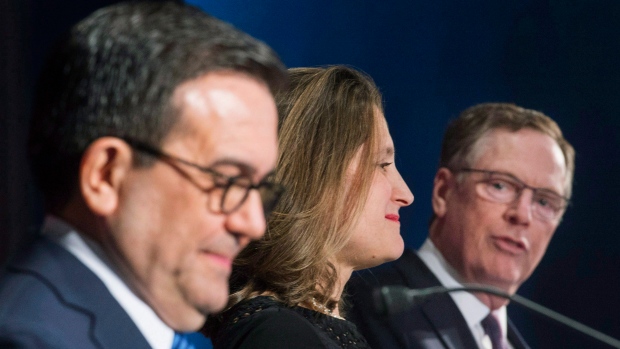Mar 5, 2018
U.S. says time running out for NAFTA deal, would mull bilaterals
, Bloomberg News

U.S. Trade Representative Robert Lighthizer said time is running out to redo NAFTA as Canada and Mexico pushed back against the threat of steel tariffs that have overshadowed talks.
“Our time is running very short,” Lighthizer said during a ministerial briefing at the conclusion of the seventh round of talks in Mexico City on Monday.
Campaigning will take off next month for Mexican presidential elections scheduled for July 1, while elections are planned in Canada’s Ontario and Quebec provinces along with a U.S. congressional midterm vote this year, Lighthizer said. “All of these complicates our work,” he said. He avoided some of the harsh language he used at the end of previous rounds.
“I feel the longer we proceed, the more political headwinds we will feel,” Lighthizer said. “We are prepared to work continuously to achieve a breakthrough.”
Lighthizer in the briefing sidestepped discussion of Trump’s comments earlier in the day that Canada and Mexico could avoid planned steel and aluminum tariffs if they accept U.S. demands for improving NAFTA. Trump’s decision on March 1 to impose a 25 per cent tariff on imported steel and 10 per cent on aluminum caught negotiators off guard in the middle of the talks over the free-trade deal.
Canadian Foreign Minister Chrystia Freeland, speaking at the briefing, repeated the threat of retaliation if the White House imposes the duties on its northern neighbor. Mexican Economy Minister Ildefonso Guajardo said it’s sensible to exclude Mexico from the tariffs and that his country could respond with trade measures of its own.
- Trump ties tariffs for Mexico, Canada to NAFTA in tweet storm
- NAFTA trade relationships 'made of brick, not of straw': Martinrea chair
- Morneau: Canada should be exempt from new U.S. steel, aluminum tariffs
RELATED
STEEL ACTION
Canada will take “appropriate responsive measures” to U.S. steel and aluminum penalties, said Freeland. Tariffs on the country’s metals are “completely unacceptable.”
Commerce Secretary Wilbur Ross and White House National Trade Council Director Peter Navarro both said Sunday that no country will be excluded from the tariffs, which Trump is expected to formally sign as early as this week. Navarro left the door open for corporate exemptions on select cases, without elaborating.
The tariffs would hit Canada the hardest of any major trading partner, as it’s the largest supplier of both steel and aluminum to the U.S. The Trump administration has defended the need for an across-the-board tariff to stamp out the potential of China, which it blames for market-distorting excess capacity, from diverting its shipments via duty-exempt nations.
SECURITY GROUNDS
Such a tariff would go against the advice of the U.S. Defense Department, which has argued for a targeted approach to implementing tariffs. Trump is justifying the action under a seldom-used trade law that permits limits on imports for reasons of national security.
The president’s tariff action complicated efforts to redo Nafta, which has been yielding little progress on the most contentious issues. Negotiators have agreed on six topic areas out of about 30 in total, said Lighthizer on Monday, adding that progress has been too slow so far but that parties tend to move more quickly toward the end of trade negotiations.
The U.S. would prefer hammering out a three-way Nafta deal with Mexico and Canada, but if those talks fail the Trump administration would consider separate bilateral deals, said Lighthizer. Trump has repeatedly threatened to withdraw from the pact.
The NAFTA partners are beginning to make headway on the difficult issues and Canada is “completely committed” to reaching a good NAFTA deal, said Freeland. Guajardo told reporters on Monday that “many” more chapters can be closed soon, ranging from telecommunications to financial services and state-owned enterprises.
No date has been announced for the next round of talks planned for Washington. The partners had aimed to complete a deal by the end of this month.


